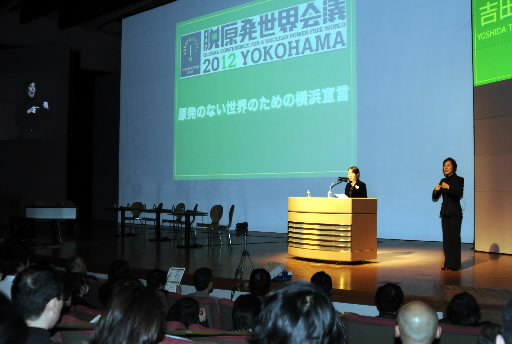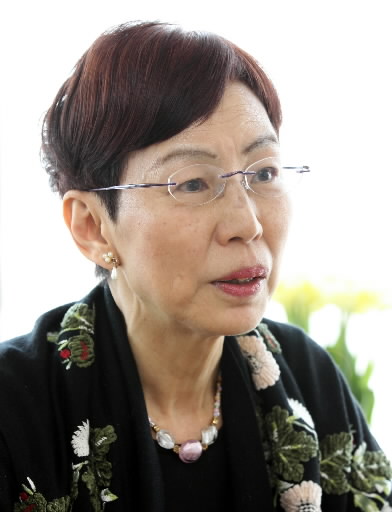Global Conference for a Nuclear Power-Free World in Yokohama
Feb. 23, 2012
One step toward a nuclear-free age
by Kohei Okata and Yoko Yamamoto, Staff Writers
Last month’s Global Conference for a Nuclear Power-Free World in Yokohama, which was organized by an executive committee consisting of representatives from six non-governmental organizations (NGOs), attracted a total of approximately 11,500 people over two days. About 100 organizations took part in the conference, which was put on with the support of 500 volunteers. In the days before the first anniversary of the accident at the Fukushima No. 1 (Daiichi) nuclear power plant, the conference can be said to have given shape to citizens’ desire to end Japan’s reliance on nuclear energy. Will this become a new trend in the anti-nuclear movement? The Chugoku Shimbun looks back at the conference and explores the prospects for the future.
Citizens play key role: Sharing of feelings
A-bomb survivors participate: Problem of how to proceed
At the opening of the conference on January 14 the main hall of Pacifico Yokohama, which has a capacity of 1,000, was full, and more than 400 people were still waiting to get in when it was time for the conference to start.
“We must create a global community without nuclear power, one in which there will be no more victims of radiation,” declared Tatsuya Yoshioka, 51, director of Peace Boat and chairman of the executive committee that organized the conference.
The conference was publicized primarily on the Internet, through press conferences and by word of mouth. Advance tickets for the two days of the conference were sold for 3,900. The members of the executive committee, who were apprehensive as the opening day arrived, were gratified by the enthusiastic response.
The 13 general meetings, which were held in the main hall and a smaller hall that can accommodate 600 people, were nearly full. The sessions covered a wide range of topics including the accident in Fukushima; harm caused by radiation around the world, including the effects of the atomic bombings; and natural sources of energy. One hundred experts on nuclear energy from about 30 countries and regions offered their opinions. In a session that addressed nuclear power and the development of nuclear weapons, a member of the Jordanian parliament expressed opposition to the importation of nuclear power technology from Japan.
Namiko Ohama, 26, a company employee and resident of Kawasaki, said, “I was surprised by the enthusiastic transnational debate that took place. We must join with the rest of the world in considering what sort of future we will choose.” Shinji Hamamoto, 21, a college junior from Yokohama, said, “I have followed the debate on the causes and effects of the accident on the Internet. My ideas, which were rather vague before, have become concrete.”
Efforts to deepen exchanges
Nevertheless, the conference was limited time-wise, and the discussions did not further develop the points at issue with regard to the atom and nuclear power, which have been covered exhaustively over years of debate. With regard to the aim of the conference, Akira Kawasaki, 43, of Peace Boat, a key organizer of the conference, said, “We targeted people who have participated in demonstrations against nuclear power and who felt they would like to learn more about the issue.” The conference emphasized interaction between participants, and time was set aside in the general meetings to allow people to discuss their feelings about abandoning nuclear power with those seated next to them.
The “citizen participation” that the committee had aimed for was particularly evident in the meetings during which citizens’ groups outlined plans they had brought with them. These sessions were held in the seven meeting rooms that can accommodate between 50 and 150 people. In the meeting at which atomic bomb survivors talked about their experiences, about 50 people sat in a circle and discussed the need to seriously consider nuclear-related issues. At one briefing session researchers and others emphasized the danger of internal exposure to radiation. They were inundated with questions from parents who were concerned about the health of their children.
Various booths were also set up outside the conference center. Peace Ring, a student group at Meiji Gakuin University, asked 170 students in the Tokyo area about their opinions on nuclear power and displayed them along with photographs of each of the students that had been interviewed. Sophomore Chihiro Kamada, 20, president of the group, said, “This conference gave us an opportunity to disseminate our thoughts on abandoning nuclear power and to connect with others who can share our feelings.”
How can the enthusiasm generated by this global conference be put to use in the future? Even now, one month later, those involved feel this is the biggest problem.
At the global conference a special session was attended by the heads of six local governments in the vicinity of the Fukushima No. 1 nuclear power plant, including Futaba, where the plant is located. They confirmed their commitment to the creation of a network by which they can work to end Japan’s reliance on nuclear power and provide support for the victims of the accident in Fukushima. Mr. Kawasaki and others are proceeding with preparations for the network.
A “Declaration by 311 Representatives for a Nuclear Free East Asia” was also presented, and the idea of NGOs in Japan, South Korea and China working together to call for an end to the use of nuclear power has come up.
Leaving things to individual initiative
But what ordinary participants do in the future has been left up to them.
“Individual initiative rather than activities imposed on people will generate energy,” said Mr. Yoshioka, chair of the executive committee. “For the time being our key role is to create opportunities for people to share their thoughts.” With regard to how to proceed in the future, Hideyuki Ban, 60, co-director of the Citizens’ Nuclear Information Center, one of the conference organizers, said, “In order to further broaden public sentiment against nuclear power, it’s important to make an effort to convey a simple message to those who do not have an interest in the issue.”
Members of organizations that have participated in the anti-nuclear movement for years also came to the global conference. Shiro Maekawa, 32, a staff member of the Japan Council against Atomic and Hydrogen Bombs (Gensuikyo), said, “I confirmed that many other people of my generation seek an end to the use of nuclear power. If only we can work together to expand our activities in the future.” Toshihiro Inoue, 53, vice director of the Japan Congress Against A- and H-Bombs (Gensuikin), said, “The conference organizers and we as well will be held responsible for ensuring through our future activities that things don’t end with this conference.”
Peace Boat was initially motivated to call for the holding of a global conference by the awareness that the experiences of the atomic bomb survivors, who live in the nuclear age that began with the atomic bombings of Hiroshima and Nagasaki, provide the basis for considering the accident in Fukushima.
Toshiko Tanaka, 73, a resident of Hiroshima and an atomic bomb survivor, attended the conference. “We must reflect on the fact that we readily accepted nuclear power as the trend of the times and stop creating new victims of radiation,” she said.
The conference’s Yokohama Declaration outlined the steps to the transition away from nuclear power, including the entire nuclear-related production cycle from the mining of uranium to the disposal of nuclear waste. The atomic bomb survivors and the citizens of the “post-3/11” world are beginning to move together toward a nuclear-free age.
Abandon nuclear power through the will of voters
Chizuko Ueno, professor emeritus, University of Tokyo
At the close of the Global Conference for a Nuclear Power-Free World, Chizuko Ueno, 63, a sociologist and professor emeritus at the University of Tokyo, declared, “Japan has been contaminated. Let’s put a stop to this sort of thing.” Kohei Okata, a staff writer with the Chugoku Shimbun, asked Prof. Ueno about the significance of the conference and the key to ending Japan’s reliance on nuclear power. The following are excerpts from that interview.
What do you think about the significance of the conference?
It is highly significant that various people from different regions of the world of different ages and backgrounds gathered in one place and expressed the need to abandon nuclear power. Many radiation victims from outside Japan, including people from the Marshall Islands, which suffered as the result of tests of hydrogen bombs by the United States, participated in the conference. This global perspective is also highly significant.
I was surprised that more than 10,000 people turned out.
With the accident in Fukushima, I think people have felt a growing need to do something. But we had to learn the hard way to get to this point. The atomic bombings of Hiroshima and Nagasaki, the Daigo Fukuryu Maru incident – Japan was a passive victim in these cases. But we can’t blame someone else for the JCO criticality accident or the accident in Fukushima.
How do you regard the background behind the building of nuclear power plants in Japan?
It’s not just a matter of how to generate electricity. It’s a deep-rooted issue that involves postwar society, regional power structures and the development of the nation’s land. For example, people created a mechanism to provide subsidies to regions in which nuclear power plants were located, and the slogan of politicians was: “Let’s create regions in which people can live without having to leave to find work.” It was difficult to oppose that.
Is it possible to abandon nuclear power?
Politicians in political parties and administrations decided on specific policies. Even if there was no debate or if deception was involved, the fact remains that the government made these decisions. And the voters are the ones who put those politicians in seats of power. Closer to home, where nuclear power plants would be located was determined depending on who was the head of the local government. Everything was decided by the voters, so there’s no reason why we can’t end the reliance on nuclear power. In the end I think it’s a matter of democracy and self-government, a case of self-governance. It’s a question of not leaving your fate up to someone else.
What is the role of Hiroshima and Nagasaki, and the atomic bomb survivors?
For human beings, nuclear energy is an uncontrollable form of energy, and Hiroshima and Nagasaki and the survivors have an important role to play in attesting to the inhumanity of the atomic bomb, which made use of nuclear energy. It is possible to switch to a policy under which nuclear energy is used for neither peaceful nor military uses.
(Originally published on February 20, 2012)









